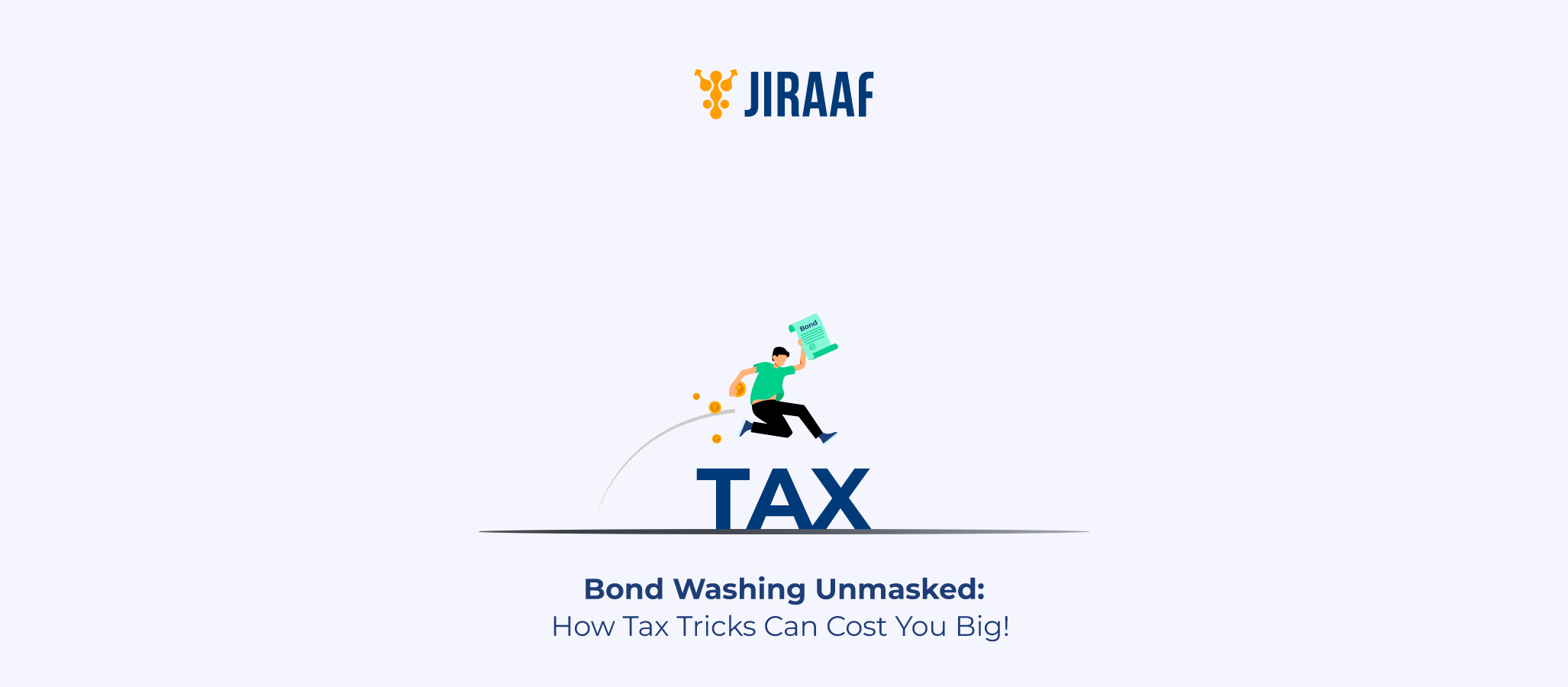Bond washing might sound like a harmless financial term, but really, it’s one of the lesser-known and discouraged methods used to avoid taxes, and the Income Tax Department in India is keeping a close eye on it. While many investors genuinely use bonds as part of their portfolio diversification, some attempt to create artificial losses through clever bond transfers to reduce their taxable income. This is exactly where bond washing comes in.
In this blog, you’ll get a complete understanding of what bond washing is, how it works, the relevant sections of the Income Tax Act (especially Section 94), and why it’s best to steer clear of such practices in your tax planning journey. Let’s dive in.
What Is Bond Washing?
Bond washing is a tax avoidance tactic where an investor sells a bond or debenture just before the interest payout (or record date) and then repurchases it immediately after, usually through a relative or related party. The aim is simple: shift the taxable interest income to someone else, usually in a lower tax bracket, while trying to claim a capital loss or avoid paying tax on the income yourself.
A Simple Breakdown
- You own a bond that pays interest on 31st March.
- You sell the bond to your spouse on 30th March.
- Your spouse earns the interest (taxed at a lower slab), and you buy the bond back on 2nd April.
- The asset remains effectively under your control, but the taxable interest is transferred.
That’s bond washing. Looks smart? Maybe. But it can be illegal under the Indian tax law.
How Does Bond Washing Work?
Here’s how a bond-washing transaction usually unfolds:
- Timing is Key: You transfer or sell the bond just before the interest is due.
- Related Party Transaction: The transfer is often to a close relative like a spouse, parent, or child.
- Quick Repurchase: After the interest is credited to the relative’s account, the original owner repurchases the bond.
- Tax Benefit Attempted:
- The interest income gets taxed at the lower slab rate of the relative.
- The original owner might also try to claim capital loss if the sale price is less than the purchase price.
This manipulation is considered bond washing, and the tax authorities disallow such deductions if identified.
Why Do Investors Use Bond Washing?
The motivation behind bond washing lies in tax efficiency—at least on the surface. Here’s why some try it:
- To transfer taxable interest income to someone in a lower slab.
- To create artificial losses to offset capital gains from other sources.
- To continue holding the same asset while tweaking how its income is taxed.
- To exploit loopholes in tax laws by playing with timing and ownership.
But just because you can doesn’t mean you should practice this, especially when the law is crystal clear about its stance.
Tax Implications and Legal Consequences of Bond Washing
The Indian Income Tax Act has specifically laid down provisions to counter such tax avoidance strategies.
Sections That Apply
- Section 94(1): Deals with transfers of securities to a relative before the due date of interest. If a person transfers a bond before the record date to a relative, and the relative gets the interest, but the bond is reacquired later, the interest is clubbed back with the transferor’s income.
- Section 94(2): Covers transactions where the buyer and seller deal in a way that lets one party claim the loss while the other earns the income. If the transfer results in a loss to the seller and the interest is received by another person, the loss is disallowed for tax deduction purposes.
If bond washing is detected, the capital loss claim is disallowed, and the interest income is clubbed back with the original owner’s income for taxation purposes.
Consequences
- Disallowance of capital loss
- Clubbing of interest income
- Interest on unpaid taxes
- Penalty for misreporting income
Key Provisions Under Section 94 of the Income Tax Act
Let’s break down what Section 94(1) and 94(2) say
| Provision | What It Says | Implication |
| Section 94(1) | If a person transfers a bond before the record date to a relative, and the relative gets the interest, but the bond is reacquired later, the interest is clubbed back with the transferor’s income. | No tax benefit of transferring interest to a lower slab |
| Section 94(2) | If the transfer results in a loss to the seller and the interest is received by another person, the loss is disallowed for tax deduction purposes. | Prevents artificial loss creation |
These provisions aim to catch tax planning that borders on evasion.
How to Avoid Falling into a Bond Washing Trap
You may not intend to break the law, but even genuine transactions can be questioned if they appear to be structured for tax benefit. Here’s how you can stay clear:
- Avoid Same-year Buy-backs: Don’t repurchase the bond right after selling it to a family member.
- Document Transactions Clearly: Keep proper records and reasons for bond transfers.
- Disclose Correctly: Make sure your ITR reflects all interest and capital gains.
- Avoid Round-tripping: Ensure you aren’t just temporarily shifting ownership for interest purposes.
If it looks like tax evasion—even if unintentional—the taxman won’t spare you.
Example of Bond Washing
Let’s consider Mr. Rajiv, a salaried employee in the 30% slab.
He owns ₹10 lakhs worth of government bonds maturing in 2026. They pay annual interest of ₹80,000 every March. On 29th March 2025, Rajiv transfers these bonds to his son (aged 20, in the 5% slab). His son gets ₹80,000 as interest income, taxed at just 5%.
Rajiv buys the bonds back on 3rd April 2025.
Here’s what the Income Tax Department does:
- Clubs the ₹80,000 with Rajiv’s income under Section 94(1)
- Disallows any capital loss claim under Section 94(2)
End result? Rajiv ends up paying full tax plus interest and penalty for misreporting.
Comparison with Dividend Stripping
Bond washing is often confused with dividend stripping. Here’s how the two differ:
| Feature | Bond Washing | Dividend Stripping |
| Asset Involved | Bonds, Debentures | Mutual Funds, Shares |
| Purpose | Transfer interest income, create losses | Avoid tax on dividends |
| Key Sections | 94(1), 94(2) | 94(7), 94(8) |
| When It Happens | Around interest payment date | Around dividend declaration |
| Common in | Bond-heavy portfolios | Mutual fund investors |
Best Practices for Ethical Tax Planning
There’s a big difference between tax planning and tax evasion. The former is smart; the latter is punishable.
| Do’s | Don’ts |
| Use deductions under Section 80C, 80D, 24(b) | Don’t transfer assets to relatives to avoid tax |
| Invest in tax-free bonds legitimately | Don’t create capital losses to adjust gains |
| Maintain documentation for every transaction | Don’t under-report interest income |
| Consult a tax advisor for complex strategies | Don’t repurchase assets immediately post-sale |
Conclusion: Is Bond Washing Worth the Risk?
If your idea of tax planning involves selling maturing investments to your spouse and buying them back two days later, think again.
Bond washing might seem like a clever workaround, but it can easily land you in trouble with tax authorities. Between Section 94, clubbed income, and disallowed losses, the tax department has all the tools it needs to crack down on such strategies.
Tax saving doesn’t have to be shady. With the right tools and advice, you can optimize taxes without crossing legal lines.
FAQs About Bond Washing
Tax loss harvesting is a legal method of booking losses to offset gains. Bond washing is a tax avoidance scheme where ownership is transferred to claim illegitimate losses or shift income.
No, it is not legal if it violates the provisions of Section 94 of the Income Tax Act. Such transactions are considered tax avoidance and will lead to disallowances and penalties, including interest and possible prosecution under the Income Tax Act.
Section 94(1) and 94(2) directly address bond washing and disallow related benefits if the transaction involves related parties and artificial timing.
Avoid short-term sales and buybacks involving relatives, keep proper documentation, and disclose all transactions honestly in your income tax return.
Discover fixed income investments with Jiraaf, a SEBI registered online bonds platform that educates and brings access to a wide array of bonds. Sign up today to explore diversified fixed income investment opportunities to support your goal-based wealth creation journey. Start investing!



